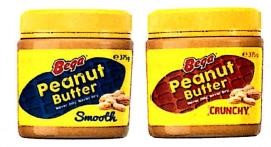The biggest battle in relation to peanut butter in Australia in the last 12 months hasn’t been the polarising question of whether crunchy is better than smooth. Rather, it has been played out in the Federal Court between Kraft and Bega in relation to the ownership of intellectual property rights following the highly publicised acquisition by Bega of Kraft’s peanut butter business in 2017, for the not insubstantial sum of $460m (which included spreads, sauces and the iconic Vegemite). It was accepted that Kraft’s pre-sale peanut butter market share was worth $60M in annual sales.
Crux of dispute
At the heart of the dispute was an argument over which of the parties held the right, following the sale, to use the distinctive trade dress or ‘get up’ which Kraft had been using for many years prior to the sale. The trade dress was described as ‘a jar with yellow lid, yellow label, blue or red peanut device (logo) and having a brown appearance when filled’, which you would hope was the case with peanut butter. A comparison of the products is shown below.
Kraft trade dress

Bega trade dress

[images sourced from case report]
Kraft’s sale to Bega
In short, the terms of the sale were that Bega was to acquire Kraft’s peanut butter business together with all of its assets and goodwill. Those assets included the production facility and rights in the recipe for the peanut butter products.
At the time of sale, Kraft was part of a multi-national with its head office in the USA. Various Kraft corporate entities (for simplicity referred to in this article as Kraft), including a company specifically designed to hold global IP rights, were incorporated both in the USA as well as in Australia.
In 2012 Kraft restructured its global business. Through a complex series of licenses and assignments, Kraft (Australia) purported to assign ownership of the trade dress to a Kraft entity in the USA.
Arguments
Kraft argued that its purported assignment of rights to Kraft USA meant it had not sold the rights to the trade dress to Bega, as those rights were owned by the Kraft USA entity following that assignment.
There was a licence in place between the Kraft USA entity and Kraft Australia entity which Kraft argued enabled it to use the trade dress in Australia (and which it said was consistent with goodwill being held by Kraft USA), but the effect of that agreement was also disputed.
Bega’s argument was essentially that it had purchased all assets of the business and, critically, the goodwill. It claimed that the fact the trade dress had never been validly assigned, together with the specific terms of the sale agreement, had the effect of transferring the rights to the trade dress to it.
Judgement
The Court agreed that Bega had acquired the rights in the trade dress as part of the sale due to factors including:
- The trade dress being recognised as an unregistered trademark.
- An unregistered trademark being inseparable from the goodwill of the business. That is, goodwill inures to the entity which uses the trade dress as one of several sources that give rise to custom in a business and does not attach to a particular asset.
- The assignment of trade dress (where unregistered trademarks) being ineffective without an assignment of the goodwill in the business.
- The licensing of unregistered trademarks being ineffective without an assignment of the goodwill in the business.
On those bases, the Court found that the purported assignment and licences between the Kraft entities were ineffective as no goodwill was assigned as part of those arrangements. Essentially, Kraft misunderstood that the rights in the trade dress could not be assigned or licensed, without an assignment of the goodwill in the business.
That meant the rights to the trade dress had always stayed with the Australian entity (forming part of the goodwill of the business) and were transferred to Bega as part of the sale.
Take home messages
Many businesses use trade marks which are not registered. Those are not always easy to identify and can exist (such as in this case) in the form of trade dress or get-up, labelling or packaging. However, unregistered marks can also include taglines, phrases, logos, brands or even trading names which haven’t been registered as trade marks.
The decision highlights the benefits of registering all commercially valuable unregistered marks (including taglines, logos, trading names, get-up, labelling or packaging which haven’t been registered as trade marks).
It also makes clear that businesses may have limited ability to deal with the assignment or licensing of unregistered marks, absent an assignment of goodwill in the business.
The judgement raises serious concerns for businesses which (in accordance with what was previously generally accepted practice) grant licences in relation to unregistered marks without an assignment of goodwill.
It was previously common for both registered and unregistered trademarks to be listed in a licence and, provided that an owner exercised control over the use of the mark, that was thought to be sufficient.
Businesses who have intergroup licences in place should be reviewing those and considering whether they hold unregistered IP which should be secured through registration.
Further, businesses which licence unregistered IP (which is not limited to, but common in franchising) should be reviewing their arrangements.
Those matters will also need to be more closely examined on the sale of businesses.
Kraft has appealed the judgement and sought a stay to restrain Bega from using the trade dress. No doubt that will be vigorously defended as Bega has filed its own cross-appeal.
In the meantime, I’ll be sticking with Vegemite on my toast.
